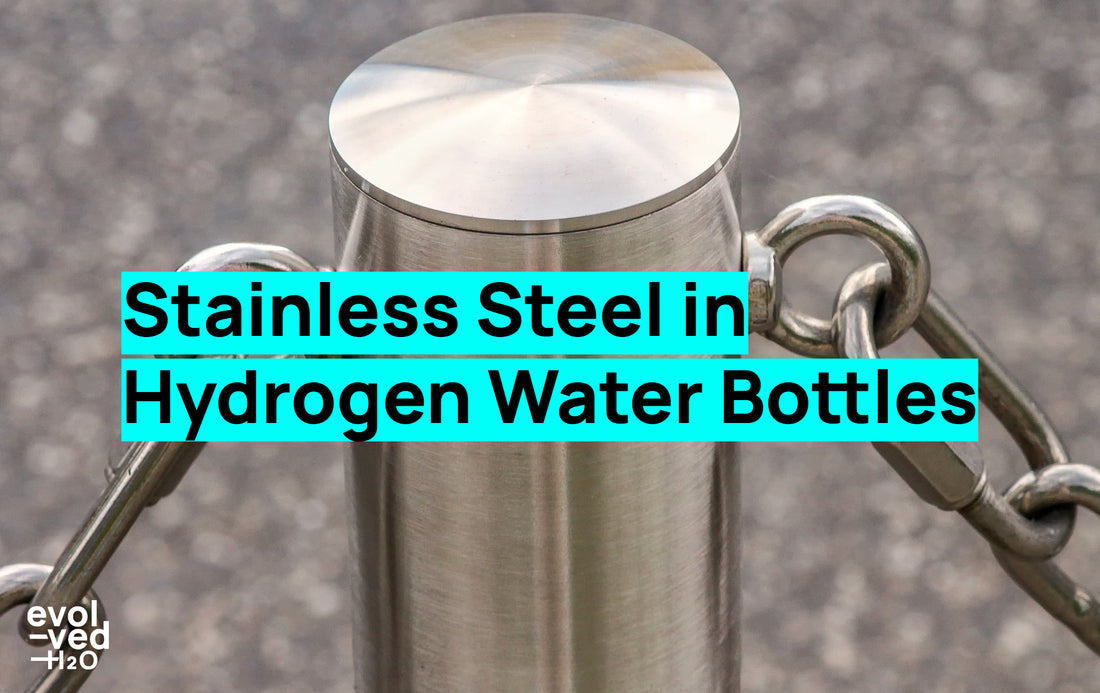
The Role of Stainless Steel in Hydrogen Water Bottles: Durable & Safe
Share
Stainless steel is a key material used in hydrogen water bottles, valued for its durability, corrosion resistance, and ability to support advanced hydrogen generation technology. Commonly used in internal components like electrodes and liners, stainless steel enhances the bottle’s performance and ensures long-term reliability. This article explores the role of stainless steel in hydrogen water bottles, its benefits, and how it compares to other materials like polycarbonate and glass.
Key Takeaways
- Stainless steel is durable and resistant to corrosion, making it ideal for hydrogen water bottles.
- It supports hydrogen production by providing a stable and conductive surface for electrolysis.
- Stainless steel components, like electrodes and liners, enhance bottle performance.
- It is recyclable and environmentally friendly, reducing waste.
- Stainless steel is more impact-resistant than glass, ensuring long-lasting use.
Why Stainless Steel Is Used in Hydrogen Water Bottles
Stainless steel is commonly used for internal components, such as electrodes, bottle bases, or liners, in hydrogen water bottles. Its popularity stems from its ability to provide:
- Corrosion Resistance: Stainless steel resists corrosion caused by exposure to water and electrolytes during hydrogen generation, ensuring the bottle remains safe and effective.
- Durability: Known for its strength, stainless steel maintains structural integrity over years of repeated use.
- Hygienic Properties: Its non-porous surface is easy to clean, reducing the risk of bacteria or residue buildup.
How Stainless Steel Enhances Hydrogen Water Bottle Performance
Stainless steel’s properties directly improve the performance of hydrogen water bottles in several ways:
- Thermal Stability: Stainless steel maintains its strength and functionality across a wide range of temperatures, making it suitable for both cold and warm water applications.
- Support for Electrolysis: When used as part of the hydrogen generation system, stainless steel provides a stable and conductive surface for electrodes, enhancing the efficiency of hydrogen production.
- Impact Resistance: Its robust structure prevents damage from accidental drops or wear, ensuring long-lasting performance.
Stainless Steel vs. Other Materials
While materials like food-grade polycarbonate and glass are also used in hydrogen water bottles, stainless steel has distinct advantages in certain applications:
- Durability: Stainless steel is far more impact-resistant than glass and provides additional structural strength when paired with polycarbonate.
- Corrosion Resistance: Unlike some plastics, stainless steel does not degrade or leach chemicals over time, even when exposed to electrolytes or high pressures.
- Weight: Although heavier than polycarbonate, its durability often outweighs the slight increase in weight for many users.
Silicone Components in Hydrogen Water Bottles
Silicone components play a complementary role in hydrogen water bottles, particularly when paired with durable materials like stainless steel. Silicone is commonly used for seals and gaskets, creating leak-proof barriers that ensure the bottle remains functional and secure during use. Its flexibility and heat resistance make it an ideal material for maintaining a tight seal, even in high-pressure systems.
By working seamlessly alongside stainless steel, silicone components enhance the overall durability and usability of hydrogen water bottles. To learn more about the importance of silicone in these designs, explore our detailed guide on silicone components in hydrogen water bottles.
Applications of Stainless Steel in Hydrogen Water Bottles
Stainless steel is strategically used in the design of hydrogen water bottles to maximise performance:
- Internal Liners: Protect the bottle’s interior from corrosion and wear.
- Electrodes: Support the electrolysis process by providing a conductive and durable surface.
- Bottle Bases: Reinforce the structure, providing stability and additional protection from impact.
Environmental Benefits of Stainless Steel
Stainless steel is an environmentally friendly material due to its recyclability and longevity. Unlike single-use plastics, stainless steel components can be recycled indefinitely without losing quality, reducing environmental impact. Its durability also means fewer replacements, minimising waste over time.
Why Choose Evolved H2O Hydrogen Water Bottles?
Evolved H2O hydrogen water bottles are designed with premium materials to ensure safety, durability, and exceptional performance. Crafted from high-quality food-grade polycarbonate and featuring advanced SPE/PEM technology, our bottles produce up to 6,000 ppb of hydrogen per cycle—making them among the most powerful hydrogen water bottles available in Australia.
With a focus on functionality and convenience, our bottles are lightweight, portable, and easy to use, offering the perfect solution for anyone looking to enjoy the benefits of hydrogen-rich water. Whether you're seeking better hydration, improved recovery, or long-term wellness, Evolved H2O hydrogen water bottles are built to meet your needs while ensuring every sip is pure and safe.
Experience the difference with Evolved H2O—where innovation meets quality for a healthier, more vibrant you.
Conclusion: The Importance of Stainless Steel in Hydrogen Water Bottles
Stainless steel plays a crucial role in the durability, safety, and performance of hydrogen water bottles. Its resistance to corrosion, thermal stability, and support for electrolysis make it a key material for ensuring reliable hydrogen production. By incorporating stainless steel, hydrogen water bottles can deliver a premium experience, combining efficiency with long-lasting durability.
For a closer look at how stainless steel compares to other materials used in hydrogen water bottles, explore our guide to hydrogen water bottle materials and learn how each component contributes to the overall design and functionality.
